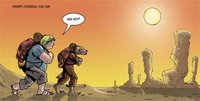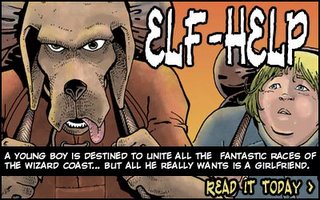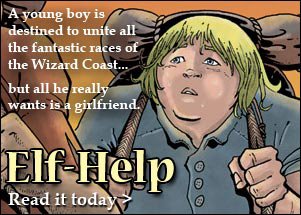the Beginning is near
the writing of Robert Burke Richardson
Wednesday, November 30, 2005
"Egg Drop Soup"
 Amazon.com Amazon.ca Amazon.fr Chapters.ca
Amazon.com Amazon.ca Amazon.fr Chapters.ca"Best Enterprise story in the book. Dr. Phlox is so well-written, and this is a sweet, but very emotional story about having hope."
-- D. Fisher, Amazon.com
"...unsappily written, very readable..."
-- Egghead and Ivory Tower
The most inspiring thing I've ever heard about something I've written comes from a convention report from one of the other authors in the book:
"You see, earlier this week, I'd read some more of the book myself. I read ‘Egg Drop Soup’ (and loved it, Robert). So I was passing the currently empty game room when I heard a very theatrical voice say something that sounded very much like the story.
"I went back and found that the child from the auction, his mother, and several other adults and children, were all sitting in a game room and the mother was reading the book. So I sat down -- I mean, how could I not!? It's my, our, the, book. The girl had just met Phlox, told him children were scared of her too. I listened and watched, as is a writer's nature. No one interrupted, everyone laughed at the right places, a few wet eyes appeared. Other people offered to read and before it was over Enterprise, Voyager and TNG were read through, ‘Concurrence’ was the last story read. During this people continued to gather, but I didn’t see anyone leave. And before someone came in to clear the room for a game, there was only standing room in a 50 (or was it 100? It wasn’t very big) person room. Our work was what drew the crowd. Perhaps the most touching thing about the reading of 'Egg Drop Soup' was this nine-year-old girl I'd met at another convention who loves Star Trek, she’s in love with Riker, and has leukemia. I heard her whisper to her mother, 'Do you think that writer knows me?' It was beautiful and heart-wrenching that a nine-year-old knew exactly what the story was about, but could be so thrilled that a writer might have been writing about her because he wrote about her illness. (I did not tell her he was from Canada, I thought she should keep her belief. Hope that was okay, Robert.)" Jolene Blaylock Shatner
Real life is always so much more amazing than fiction.
Related posts: Zen fiction, Interview with Susan S. McCrackin
Monday, November 28, 2005
Episode 4 question
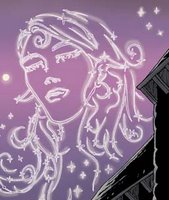 A question in anticipation of Elf-Help episode 4 (just three more days!):
A question in anticipation of Elf-Help episode 4 (just three more days!):In episode 3, Coby (the dog-boy) says to Mar (the fat kid), "But I thought you already -- "
The sentence finishes:
a). " -- had sexual relations with a woman."
b). " -- served with a band of Amazon Kobold Marauders."
c). None of the above. (eg. Coby is interrupted, thus saving the strip from a rating higher than PG).
Find out this Thursday (Wednesday for folks with AOL).
Sunday, November 27, 2005
Recommendations
I've been asked to recommend some stories, preferably available for free online (since people I know are lazy and cheap):
In the Late December, by Greg van Eekhout (Strange Horizons): Not only will this story get you into the holiday mood, but it will teach you to love speculative fiction (if you don't already):
They come to a cloud of silver mist, and there Santa finds a little boy made of molten silver with liquid silver eyes and sweeping silver delta wings. His wrists are ringed with missile launchers, and a rounded cone emerges from a cavity in his chest. Once there were many silver boys, fleets of them, protecting the outermost parts of inhabited space against things that came from outside inhabited space. But now, there is only the silver boy.
Santa consults his list. "Well, well, well . . . who do we have here?"
The Wages of Syntax, by Ray Vukcevich (SCIFICTION): Another story that works equally well for newcomers and more experienced SF readers alike. Also, if you're a Star Trek fan and have always been perplexed by how Hoshi can learn an alien language she's never heard before just by trying really, really hard, this one's for you:
He grinned and wrote "Spontaneous Competence" on the chalkboard. With an audience like this, he needed something jazzier, something contemporary, something they could relate to, and since no one in the popular press was calling his effect "Spontaneous Competence" as it should rightly be called, he wrote what they actually were calling it underneath the proper name. He wrote "Universal Translation."
He could hear them relax, a kind of good-natured settling in. This was more like it. Who knew, maybe the professor would even talk about aliens.
"First, I must convince you that the so called 'universal translation' you see on TV and in the movies is impossible in principle."
And a one and a two and a three.
"And then I will explain how it can be done."
If you're interested in music -- particularly stuff you probably wouldn't normally encounter -- check out The Apparat podcasts, assembled by Warren Ellis. This goes out weekly, and there's a good backlog of material at this point, too.
Thursday, November 24, 2005
Tuesday, November 22, 2005
Has Science Fiction "Lost its Stones"?
 Rick Remender and Tony Moore's Fear Agent is the best new comic on the shelves, and... it's science fiction! Been awhile since that's happened. The comic speaks for itself, but Rick speaks, too, in an interview at ComicBookResources:
Rick Remender and Tony Moore's Fear Agent is the best new comic on the shelves, and... it's science fiction! Been awhile since that's happened. The comic speaks for itself, but Rick speaks, too, in an interview at ComicBookResources:Let's not mince words-- science fiction has lost its stones. For me the high water mark of sci-fi was in the 1950's. Back then all of pop culture was obsessed with the genre. The communists had reignited our xenophobia and science fiction exploited and mirrored that fear. Monsters from Mars, mutants, killer robots and giants were locked in a constant struggle with lantern-jawed American spacemen in rickety rocket ships. They were the rough and tumble men who fought World War II, and these aliens were the next threat to be dealt with. They explored unknown worlds kept alive by two vacuum hoses feeding life-giving oxygen into their dome-shaped glass helmets.
As the decades passed, sci-fi became so interested in explaining how it could all really happen that it stopped giving us those fun, balls-to-wall, exciting stories. Instead, it became the stomping ground of nerds who would rather know exactly how the warp engines actually work than have high adventure. They focused on trade federations and on the intricacies and politics of alien worlds. However, when done right, this offered us a momentary reflection on our own society, but it wasn't very fun. They took away the tooth and grit and made it sterile. Though in some circles 'Star Wars' and 'Star Trek' are loved by people whose love of the genre allows them to overlook their lowered expectations, sci-fi has long since lost the collective mainstream conscience and it lost me.
Despite my love of Fear Agent, I'm not sure I agree with Remender. SF could definitely do with a shot in the arm of pure, uncut pulp, but why lose the hard elements (how things actually work), or the character/soap stuff (Star Trek) in the process? I'd like to see SF that has matured to the point that it's not ashamed of any periods in its past -- a literature that could draw equally on Wally Wood, Gene Rodenberry, or Richard Morgan; Jules Verne, Isaac Asimov, or Kelly Link.
"Everything is good," is probably a naive formulation -- and sure, not every story can be all things to all people (a narrower focus can deliver a more powerful dose of what certain readers crave) -- but I am starting to see the emergence of the sort of fiction I mean. David Moles' Planet of the Amazon Women takes one of the pulpiest of pulp tropes and polishes it up with a bit of far-out extrapolation, and the kind of thoughtful characterization that once was associated exclusively with literary fiction. Benjamin Rosenbaum's Biographical Notes to ‘A Discourse on the Nature of Causality, with Air-Planes’ manages to be alternate history, science fiction, fantasy, and metafiction, all without sacrificing a sense of pulse-pounding, pulp-style adventure. And, I suspect, Fear Agent itself will come to deliver everything SF can, including social and political situations relevant to the real world, plausible (or at least internally consistent) explanations of how things work, and the sort of nuanced characterization not generally found in the SF of fifty years ago.
Monday, November 21, 2005
Elf-Help Episode 3 Question
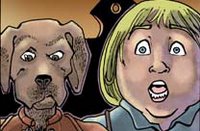 Three days until the third episode of Elf-Help goes live (two days for folks with AOL).
Three days until the third episode of Elf-Help goes live (two days for folks with AOL).When last we left our intrepid time-wasters, Gerd's uncle's ship had just returned from a trading expedition. "And if they're just pulling into the harbor now, it means --
A). -- there's gonna' be a huge party tonight!!"
B). -- we're about to be attacked by Amazon Kobold Marauders!!"
C). -- they probably had to revert to canibalism to survive!!"
(previous question here)
The Adventures of Professor Thompson Tang Gao, Rationalist
I've always wanted my own recurring SF character: a person and milieu that could generate a whole whack of stories, and I could revisit periodically to see how we've both developed.
As luck would have it, I have just such a character in Professor Thompson Tang Gao. Named after the surnames of my roommates when I first moved out, the true scope of the professor's adventures came to me in a dream, which is self-indulgently cool. His adventures come to me in non-linear fashion, and so far I've got:
Episode I: Professor Thompson Tang Gao & the Creatures from Planet X (read it for free right here, or in Amazing Heroes vol. 1)
Episode II: The Case of the Martian Ambassador (read it for free at Would That It Were)
Episode IV: Professor Thompson Tang Gao & the Clockwork Man (upcoming in Robots & Time, from Altair Press)
Episode XX (or so): Negation Elimination (in All-Star Zeppelin Adventure Stories)
Episode XXI (or so): Professor Thompson Tang Gao & the Nature of Reality (currently in progress)
Part of the inspiration for Professor Gao came from my realization that some science fiction stories -- the ones that comprise the original Foundation Trilogy, for instance -- are really a sort of fantasy. Part of their allure is in imagining, for the duration of a story, anyway, that rationality might really allow one to predict the future (or solve crimes with perfect accuracy, which I assume is what fans of the CSI shows are responding to).
That first story was written back in 2000, when the idea of a lone rationalist making his way in an irrational universe seemed sort of quaint; now, it seems positively vital.
Friday, November 18, 2005
Fiction: Professor Thompson Tang Gao & the Creatures from Planet X
by Robert Burke Richardson
Professor Thompson Tang Gao, rationalist, adjusted his telescope and glanced at the grandfather clock that stood against the wall of his well-appointed sitting room: he still had a few minutes. A large part of the view had become obscured when the other space vessels arrived, but the patch of stars Gao wanted remained clear. Free of the obscuring effects of a planetary atmosphere, Neptune was just visible as a blurred gray disc. It was the twinkling vastness beyond Neptune, however, that had so powerfully captured his imagination. Could there, he wondered again, be a ninth planet?
Reluctantly, Gao placed the telescope in its case, wiping its gleaming surfaces and taking special care with the lenses. He removed his bifocals and searched his desk drawer for reading glasses and a pen. An ornate bottle, its supply of India ink nearly extinguished, was deemed harmless enough to be placed on the antique desk: even rationalists could be clumsy, from time to time.
He dated an entry February first, 1882 and began, in flowing letters, to write:
The ninth planet--Planet X--must be extremely cold, owing to its great distance from the sun. Another consequence of this distance would be the appearance of the sun itself: Planet Xers should see it as only the size of an average star, though exceedingly bright.
Biological peculiarities will correspond, principally, to eyesight (because of the lack of light) and a heightened ability to retain heat. Technological diverseness would probably stem from the landscape, which I imagine to be snowy and windswept, like the highest peaks of Olympus Mons.
The grandfather clock chimed, signaling the change of the hour, and Morovan entered with a tray of tea, a Venutian, and two Martians... [continue reading]
Wednesday, November 16, 2005
Monday, November 14, 2005
Elf-Help episode 2 teaser
Well, we're half way to the second episode of Elf-Help, and speculation is running rampant:
What is that ship coming into the harbor?
Are the titular elves going to provide help -- or are they the ones who need it?
And, most importantly, does that fat kid call the girl a b!+c#?
Here's a hint-filled multiple choice question to get you over the soon-to-be-weekly Monday waiting-for-the-next-episode hump:
(Choose the best answer.)
Next week...
a) Coby (the dog boy) steps in, deftly deflecting Mar's insult.
b) Gerd (the girl) strangles Mar (the fat kid) with her scarf.
c) The kids are suddenly attacked by Amazon Kobold Marauders.
Find out in just three days!!
Thursday, November 10, 2005
Elf-Help Press Release
The official Elf-Help press release is starting to make the rounds. Check it out -- it's okay, I'll wait.
Back now? There's an art to writing press releases, and I'm not sure I'd be good at it, myself. Steve did a good job blanacing quotes and information, and SilverBulletComicBooks kept the images nice and big.
All in all, a very nice experience for a first press release.
Update: There's one up on The Pulse as well. Not as nice as the SBC one, and for some reason they call the website Stan Lee's Sunday Funday Comics, but still cool. David Lynch Kafka
Monday, November 07, 2005
Zhuang Zi: the Great Leveler
Here's a great translation of one of the chapters of the Zhuang Zi that inspired "When the Great Clod Belches":
Nan-guo Zi-qi sat, casting a shadow over his low table. Then he raised his head toward heaven and sighed, besundered as though one who had lost his companion. Yan-cheng Zi-you stood ready to serve before him, and said, "In what realm were you, such that you could cause your form to resemble that of a withered tree and your heart to be like dead ashes? The one who at this time leans against his table is not he who leaned against it a moment ago."
Zi-qi said: "Yan, you did well to ask that question. Just now I lost my self. Did you know that? You have heard the pipes of man and have not heard the pipes of the Earth. You have heard the pipes of the Earth and have yet to hear the pipes of Heaven."
Zi-you replied, "I dare to ask for the gist of it."
Zi-qi said: "Now, when the Great Clod belches gas, it is called the wind. Perhaps at first it does not arise, but when it does arise the myriad cavities angrily bellow. Surely you cannot be the one person in the world not to have heard its whistling. The rocky outcroppings on the mountain peaks, the hollows and cavities in the great trees of a hundred spans: Like nostrils, like mouths, like ears, like hubs, like sockets, like mortars, like puddles, like pits. Sounds like cataracts, moans, hoots, gulps, shrieks, howls. The one that goes first sings "yuuu", and the one that follows sings "ouuu." With a cool breeze there is a minor confluence of sounds, and with a violent windstorm there is a major cacophony. When a violent wind gains surcease, then the multitude of cavities become empty. Have you alone failed to observe their bending and waving?"
The author of this translation, Patrick Edwin Moran, goes on to comment:
Permissibility comes from giving permission. Taking a particular path creates it by walking. Creatures are what they are said to be. How is it that things are the way that they are? They are thus because people affirm them to be so. How is it that things are not some way? They are not that way because people deny them being that way. Things are firmly endowed with the ways that they are, and they are firmly endowed with their permissibility. There is no thing which is not as it is, and there is no thing that is not acceptable (permissible).
For me, this comment really drives home how relevant to today's issues Zhuang Zi is: after all, no thing being not acceptable is not unlike everything being permissible, which is largely the state of things in our post God-is-dead world, where opinion is often regarded as more worthy than fact.
Therefore on account of the aforesaid, let us consider a straw and a rafter, or an ugly person and Xi Shi, the great and the shifty, the agreeable and the perverse. The Dao links them all into a single whole. Its division is a completion. Its completion is a destruction. In all cases, creatures have neither a completion or a destruction but are once again melded into one. Only those who have attained [the final goal] know how to link everything into a single whole. Those who so act do not employ [what other people engage themselves in] and give things an abode in constancy. Constancy means utility. Utility means linking things into one. Linking things into one means getting it. Once you've gotten it you are almost there.
I think this last bit, however, is stated a little too strongly: the idea that linking things into one means getting it is one of those "great understandings" that must fall from our clustered hides and wither in the earth. Trying hard to make things One, one can fail to notice they are all the same thing, and end up close, so very close...
At least, that's how I feel about it these days. :) Filed under: Tao Te Ching Dao De Jing Lao Tzu Daoism asian philosophy Yoda
Sunday, November 06, 2005
When the Great Clod Belches
My story, "When the Great Clod Belches," is now live at Son and Foe.
...I look at the redwood and pee my pants but get to the top through a miraculous collaboration of determination, mind-over-matter willpower, and ass-numbing flatulence. I look down, and the world spins. I’m a lumberjack, and I’m not okay.
“We’re ramblin’ beyond the dust o’ this world, kiddo,” says Chu the Magpie, balancing on one foot on the end of a branch. “I’m gonna talk a little crazy and I want you ta try’n listen a little crazy too, okay?” He hops a little closer, staring and staring with his idiotic little twit bird eye.
“SQWAAAK!” he yells right in my ear. I nearly fall off the tree. Chu flies away and shits on Christopher’s head and shoulder, which makes me laugh...
Friday, November 04, 2005
Susan S. McCrackin: Transfiguration
Since one of the reviews of Strange New Worlds v8 specifically states that Susan's story, Transfiguration, is superior to my story in the same volume ("[Egg Drop Soup] nearly ties with "Transfigurations" for most emotional... but not quite"), I thought I better catch up with her and learn how she pulled it off.
Robert: Beleena goes on quite an emotional journey in your story: it's almost like a little novel, with all the emotional twists and turns. Was Beleena's emotional growth something you had mapped out from the beginning, or something that evolved during the writing?
Susan: LOL! All I had in my head was the first line of the story -- "I'm afraid of fire." I woke up the Sunday morning before the contest deadline with that line in my head and nothing else. I figured it out as I went along. I didn't know Beleena's name or what the story was. I think I must have dreamed the concept and only remembered that first line when I woke up. I started writing late morning or early afternoon and had most of the story done by that night. I came home from work the next day and finished it.
Thanks to some wonderful friends, I had the story edited by Tuesday night, printed and ready to go. It was over-nighted on Wednesday and that was that.
I knew it was something special when I wrote it. It just had that feel, but I didn't know if it was good enough to make the cut. I had never written a story that fast. As a matter of fact, there had been a lot of chatter on the message boards the Friday before the deadline about people just writing, spell-checking, and mailing a story. I remember thinking that I would never be able to do that! But I did and it turned out to be a winner.
It was fun watching this story unfold. When I wrote "but that was before she came on board," I didn't know who "she" was. It wasn't long before B'Elanna's name appeared on the paper and I realized that she was the right one to be there. Thank goodness she did because everything else just fit.
I've always liked B'Elanna and felt that she was never realized as a character. It was fun to explore this side of her -- to find the part of her that would allow her to connect with a child in such a special way.
So, next question?
Robert: Are there stories you wrote in the past that you think prepared you to write this one, or helped you develop the kinds of skills one needs to pull off a tale like this? Life experiences?
Susan: No, I think it's more like only being about 8 years old at heart that helped me write this! LOL!
Actually, that's an interesting question. I don't think there is any one experience that helped me write this. You have expectations of what will happen; sometimes your expectations are met, but often your expectations were too high and they get you in trouble. And isn't that life?
As far as Beleena was concerned, I think it was the gift of the dream and then I just tried to put myself in her place and tried to feel what she felt, tried to think the way she thought. Once I got there, it just sort of happened.
What was fascinating was experiencing the world through Beleena's eyes -- or the lack of them. Since she couldn't see, everything had to be touch, sound, smell. It was really different, especially not being able to describe how people looked or what colors were around her. Without her sight, everything was much more internal with Beleena. That was a totally different experience and harder to write at first, but it got easier.
Robert: What are you writing now, and what would you like to be writing in the future?
Susan: What am I writing now? Not much of anything, unfortunately. I'm slowly editing a novel I wrote (non-sci-fi). I truly appreciate anyone who is good at editing. I'm terrible at it.
What would I like to be writing in the future? I have this wonderful (my idea so of course its wonderful) sci-fi story I would love to really get into. I've written about five chapters and know that it would really capture me if I could give it some time. But I think the best I can hope for right now is to try writing some short stories and not try to stay in any one genre. I'm more comfortable in sci-fi, but I would like to try other things.
Bottom line, though, is that I would just love to be writing anything and I'm not doing that. I need to get back to it and stop letting other stuff (like remodeling the bathroom and kitchen) get in the way.
Dean does so much by waving this wonderful carrot in front of us and begging us to come after it. There are so few opportunities like the one he offers. That man is truly someone special.
Note: For those thinking of entering, there's a copy of the rules circa volume 8 at psiphi.org. SNW 10 should open for submissions sometime after spring 2006.
Tuesday, November 01, 2005
Parting Ways
 Over the weekend I discovered a fantastic graphic novel called Parting Ways, by Andrew Foley and Scott Mooney:
Over the weekend I discovered a fantastic graphic novel called Parting Ways, by Andrew Foley and Scott Mooney:Peter Orbach wants to live. It's unfortunate he didn't realize this earlier; it isn't going to do him much good now that he's in Hell.
Peter isn't the first person to believe he shouldn't be damned, but he may be the first that's objectively correct in the assessment. Somehow, his soulless body still lives... and from all appearances, it's doing great without him...
It's a great modern day fantasy story that moves along at a nice clip while giving us plenty of character. Author Andrew Foley makes great use of the premise to comment on the follies of modern life:

There's a hefty preview at the publisher's site.
